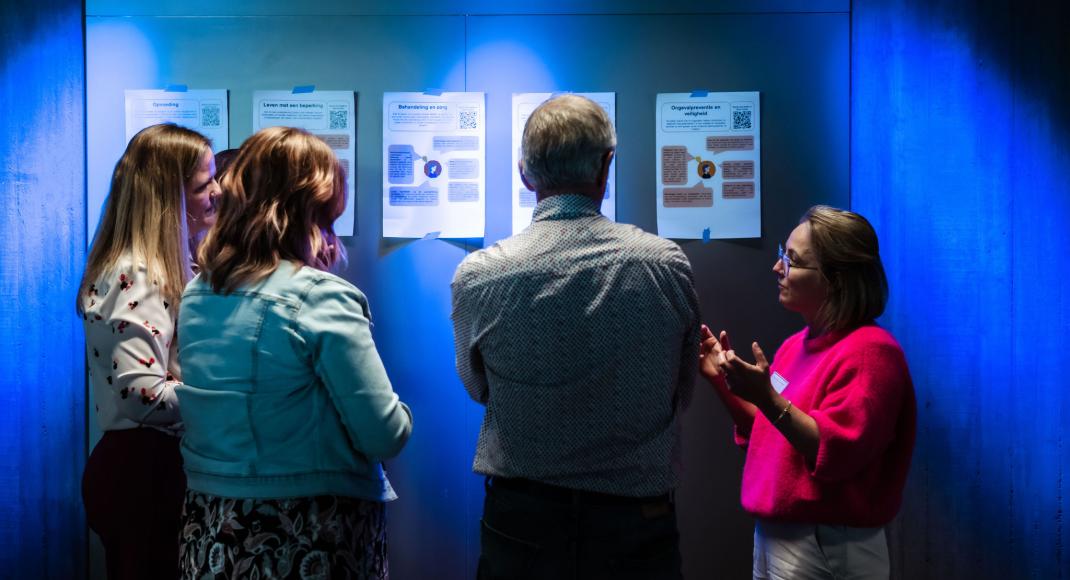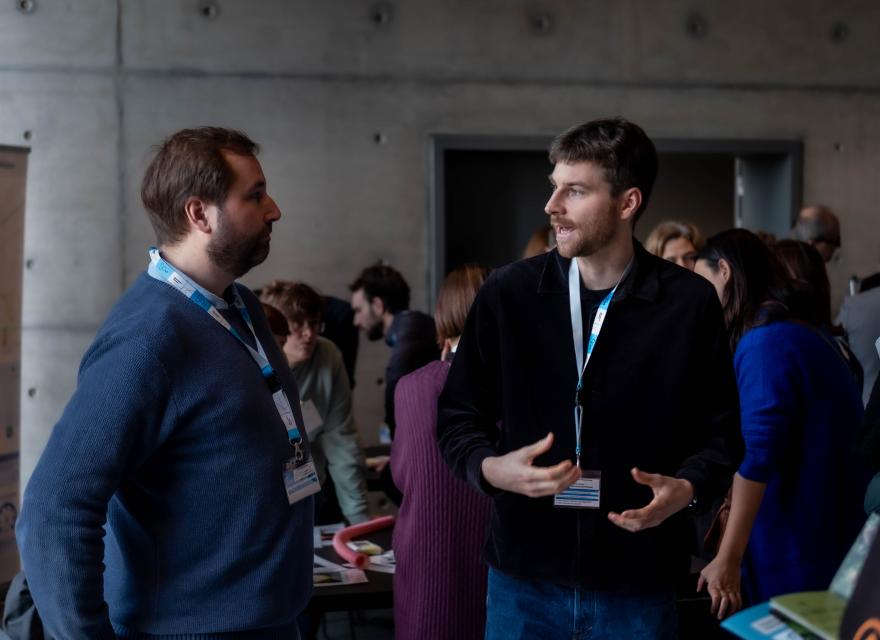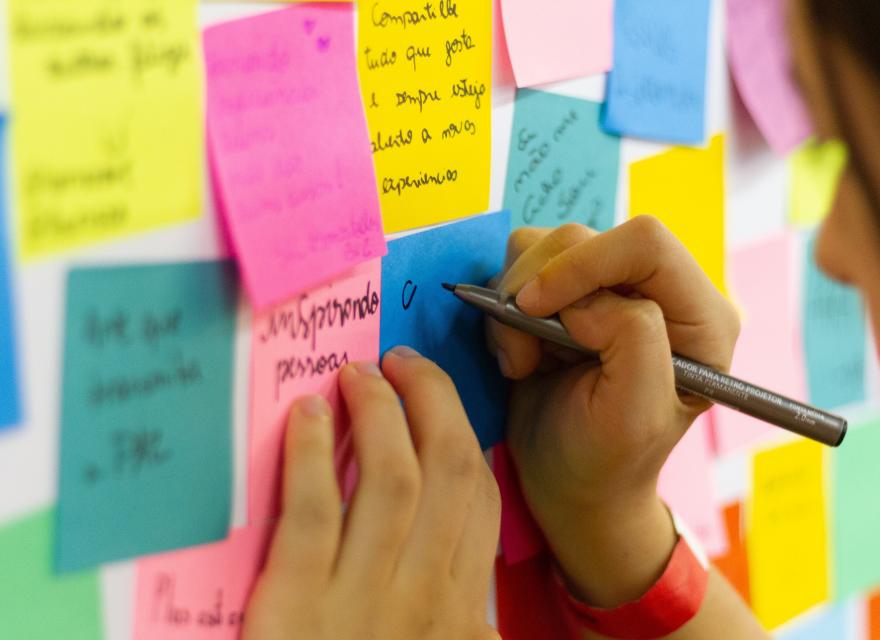Report of the amai! co-creation sessions
How do you come up with a societally relevant idea for AI? And how do you find the right people to make your idea a reality? The past weeks, amai! organized co-creation sessions at various locations in Flanders where many ideas of citizens for AI were further sharpened. Companies, civil society organizations and knowledge institutions sat around the table and discussed together how AI can make a difference.

Each session departed from the clusters of ideas citizens shared for AI. First, a group of attendees further deepened the problem or need and put the challenge in focus. They then looked at whether and how AI could make a difference to this challenge.
Are you curious about the results of these sessions? Below we briefly share what AI ideas participants explored at the different venues.
Domain ‘Work’, Kortrijk (02/05/2023, Hangar K)
- A first group explored the possibilities of AI in language education for non-native newcomers. Can offering personalized learning content make learning Dutch more motivating but also more fun? This personalization could be done in different ways. Does it make sense to do this based on categories such as age and gender? Or should we start from the learners' interests and activities?
- A second group worked on a concept by drawing inspiration from two clusters: "Matching" and "Mental & physical health at work". They thought about whether ergonomic advice could be given to employees and employers at risk of physical complaints. Can an AI system start from insights from ergonomic studies and reports for this purpose, and offer advice based on this? The input for this advice can consist of questionnaires, but also for example wearables. In this way, employees can continue to work in a qualitative manner for a longer time.
Domain 'Climate & Environment', Brussels (11/05/2023, FARI)
- Inspired by the cluster "Weather and Climate Change," the first group wondered how we can provide advice to gardeners on plants: how can they use (rain) water sparingly? Can AI formulate comprehensive and sustainable advice around watering based on data on soil type, expected precipitation and water quantity needed by different plant species?
- Group 2 focused on initiatives and solutions around the Sustainable Living cluster. The group looked at how to scale up local sustainability initiatives. To do this, facilities and needs in a neighborhood or district are mapped by analyzing public, social and personal data. Collecting and sharing existing knowledge and tips can also facilitate sustainable choices. One way to set up this knowledge collection and transfer could be, for example, developing an app or browser plug-in that provides sustainable tips and eco-advertisements to users based on their browsing behavior.
Domain "Health," Ghent (16/05/2023, De Krook)
- Group 1 looked at how personalized advice can motivate people with rheumatoid arthritis to (continue to) exercise so that their social lives do not suffer because of their more limited mobility. Can they receive advice based on a comparison of current condition with previously measured performance, weather conditions and available sports opportunities. Can location-based meet-ups continue that encourage them to exercise in groups?
- Group 2 departed from the "Mental Health" cluster: can we capture signals of mental (dis)well-being to make employees aware of energy givers and energy consumers? All kinds of aspects of energy givers and takers were considered. What is the influence of the work environment? Can we analyze it, then make recommendations for positive adjustments? Support can be given to employees after e.g. a conversation with a triage chatbot or by filling out a personalized questionnaire, after which they are referred in a targeted way.
- Group 3 worked on the cluster "Diagnosis" and thought about how bundling different types of data can create an early warning system. This system combines previous health problems with current data on the patient to detect new problems more quickly. The system can assist general practitioners in diagnosis but also support them in communicating to the patient by offering explanations in text and images tailored to the patient.
Domain "Mobility," Antwerp (24/05/2023, The Beacon)
- Group 1 worked on the clusters "modes of transportation" and "road safety". On the one hand, this group looked at how multimodal planning can be done more refined. An AI solution here could be to elaborate traffic alternatives on more criteria than currently used (e.g., by taking time gained or ecology into account). There was also a focus on better detection and prevention of dangerous situations in traffic. An AI solution here could include looking at how the thresholds of AEB systems of cars can be made dynamic and adapted to specific traffic situations.
- Group 2 explored the "Leisure & Tourism" and "Optimization & Infrastructure" clusters. They worked on the idea to motivate walkers and cyclists to take alternative routes. The idea is to surprise users with inspiring routes on the one hand and to map and register these routes as 'slow road' on the other.
Domain "Health," Leuven (08/06/2023, Health House)
- The first group was inspired by the "Treatment and Care" cluster. They identified a need to defragment the various medical platforms and make them more transparent so that both caregiver and patient have a clear view of the care pathway already completed and ongoing treatment. An AI solution could potentially adapt a care pathway according to measurements by both the patient's smart wearables and self-reported care and lifestyle data. An AI solution here could also be a smart signaling function that could automatically schedule interventions, such as an early appointment with a specialist or lifestyle advice.
- The second group selected the "Healthy Living" cluster. Their focus was on promoting health literacy through knowledge sharing to move health care from cure to prevention. One possible AI solution they identified was a "medical intervention chatbot" that could analyze persistent patient complaints. In addition, they also saw a role for AI in centralizing data streams to bring communities together and motivate them through lifestyle advice, examples and community impact displays. This centralization would also help inform healthcare providers about the impact of preventive health actions.

